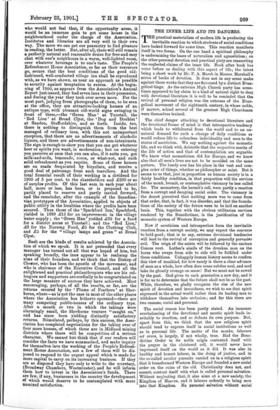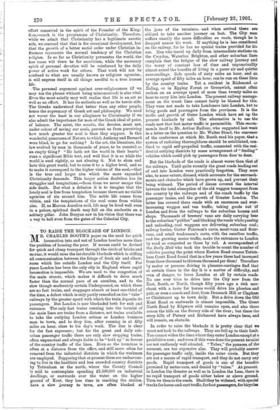THE INNER LIFE AND ITS DANGERS.
THE practical materialism of modern life is producing the inevitable reaction to which students of social conditions have looked forward for some time. This reaction manifests itself in two forms. On the one hand a spiritual philosophy is undermining the bases of naturalism and agnosticism; on the other personal devotion and practical piety are reasserting the neglected claims of the inner life. Book after book has come before us dealing with this aspect of life ; the latest being a short work by Mr. F. A. Marsh in Messrs. Marshall's series of books of devotion. It does not in any sense make against these works that they are flavoured by a distinct Evan- gelical tinge. As the extreme High Church party has some- times appeared to lay claim to a kind of natural right to deal with devotional literature it is well to be reminded that the revival of personal religion was the outcome of the Evan- gelical movement of the eighteenth century, in whose noble, if narrow, school several of the greatest High Churchmen were themselves trained.
The chief danger attaching to devotional literature and the devotional frame of mind is that introspective tendency which leads to withdrawal from the world and to an un- natural demand for such a change of daily conditions as would reduce life to colourless individuality and man to the status of asceticism. We say nothing against the monastic life, and we think with Aristotle that the respective merits of the life of action and that of contemplation are arguable. We know what monasticism did for Europe, and we know also that all men's lives are not to be moulded on the same pattern. The lonely seer has his place in the vast and com- plex order of things, whether as philosopher or saint. But it seems to us that, just in proportion as human society is in a fairly healthy condition, in that proportion will the services of the monk, hermit, or contemplative visionary be less called for. The monastery, the hermit's cell, were partly a reaction from a corrupt and decaying social order. The visionary in the desert perceived that nothing more was to come from that order, that, in fact, it was disorder, and that the founda- tions of the society of the future were to be laid on another basis. This, together with the obvious utilitarian services rendered by the Benedictines, is the justification of the monastic system of Western Europe.
Now if asceticism and introspection form the inevitable reaction from a corrupt society, we may expect the converse to hold good ; that is to say, extreme devotional tendencies will lead to the revival of corruption and generally pervasive evil. The reign of the saints will be followed by the unclean Comas rout. Luther's simile of the drunken man on the horse who sways from side to side will be fulfilled under these conditions. Unhappily human history seems to confirm this view of mankind, for bow rarely is there a clear advance of man as a whole, how often does sense subdue soul, and soul take its ghostly revenge on sense ! But we must not be cowed by the past. God gives to each generation a new day, and it is for us to determine that the future shall not be as the past. While, therefore, we gladly recognise the rise of the new spirit of devotion and inwardness, we wish to see that spirit expressed in the actual world rather than its leading men to withdraw themselves into seclusion ; and for this there are two reasons, social and personal.
The social reason has been partly stated. An immense overbalancing of the devotional and ascetic spirit leads in- evitably to reaction, and so defeats its own purpose. But, apart from this, we think that the new religious spirit should tend to express itself in social institutions as well as in personal life. The motto of the monks, laborare es t orare, is largely, if not wholly, true. Had the Bene- dictine Order in its noble origin contented itself with the prayer in the cloistered cell, it would never have impressed itself on the world as it did. It was also in healthy and honest labour, in the doing of justice, and in the so-called secular pursuits carried on in a religious spirit that it transformed Western Europe and founded a new social order on the ruins of the old. Christianity does not, and cannot, content itself with what is called personal salvation. Without negleeting that, it also aims at a new society, the Kingdom of Heaven, and it labours ardently to bring men into that Kingdom. No personal salvation without social effort conceived in the spirit of the Founder of the King- cbm,—such is the programme of Christianity. Therefore, While we admit that Christianity has a legitimate ascetic side, we contend that that is for occasional development, but that the growth of a better social order wider Christian in- fluences represents the normal tendency of the Christian religion. In so far as Christianity permeates the world, the less room will there be for asceticism, while the necessary spirit of personal devotion will be reinforced by the daily power of active work for others. That work will not be confined to what are usually known as religious agencies ; it will express itself in all things needful to a true human life.
The personal argument against over-religiousness (if we may use the phrase without being misconceived) is also vital. Even the most saintly may well realise that life is an art as well as an effort. It has its esthetic as well as its heroic side. The Greeks understood that better than any other people, hence the supremacy of Greek art and philosophy. We need not waver the least in our allegiance to Christianity if we also admit the importance for man of the Greek ideal of poise, of balance. The saint, the ascetic, the devotee, must not, under colour of saving our souls, prevent us from perceiving how, much greater the soul is than they suppose. Is this wonderful panorama of Nature, to which Anthony and Bernard were blind, to go for nothing? Is the art, the literature, the law evolved by man in thousands of years, to be counted as an empty thing? "He hath set the world in their hearts" runs a significant Bible text, and well that it is so while the world is used rightly, as not abusing it. Not to shun and hate this great world, but to raise it to a higher level, and so to make it correspond to the higher visions of the soul,—that is the true and larger aim which the more expanded Christianity demands. This larger action doubtless has its straggles and temptations,—from them we never escape this side death. But what a delusion it is to imagine that the lonely soul is free from temptation because there are no visible agencies of sin around him. The noble life comes from within, and the temptations of the soul come from within also. If, as Marcus Aurelius said, life may be lived well even in a palace, spiritual death may fall on the anchorite on a solitary pillar. John Bunyan saw in his vision that there was a way to hell even from the gates of the Celestial City.







































 Previous page
Previous page